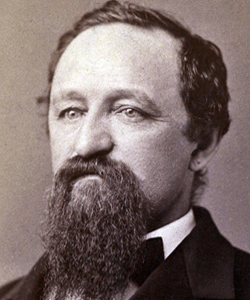On April 10, 1865, Charles Albright and George Baylor led their respective units against one another in battle near Fairfax Station, Virginia. The former commander employed his hard-driving personality when leading his Union troops on campaigns against Confederate soldiers in the South. Baylor, on the other hand, did not immediately convey the impression of a warrior given his slight frame and weight of only 120 pounds. Wounded, captured, and later released by Union forces, he proved himself as a resourceful and resilient leader in the Confederate army. These unlikely warriors shared experiences as students at Dickinson College, but the directions they took after leaving campus brought them together on the battlefield not as fellow alumni but as fervent opponents.
Albright, a devout Methodist who refused to smoke or drink, entered Dickinson in 1848 with the Class of 1852. He withdrew from the College in 1851 to study law and began to take a solid stance against slave-holding states. By 1854 Albright moved to Kansas with the Western Pennsylvania Kansas Company as part of a campaign encouraging an influx of families opposed to slavery and committed to temperance. Disappointed with the organization’s effectiveness, Albright concentrated soon thereafter on his law practice in Mauch Chunk, Pennsylvania.
In 1857, as Albright began to establish his law practice, Baylor entered Dickinson with the Class of 1860. Focused on the “intransient beauty” and enlightenment of human thought, Baylor did not demonstrate any resilience to his education in the North despite his origins in Virginia. Nevertheless, he enlisted in the Confederate army one year after graduation and committed to the full duration of the conflict. Over the four years that followed, Baylor gained a reputation as a bright and phenomenal young soldier, which he strengthened throughout 1864 and 1865 on his successful raids disrupting Union lines of communication. On April 10, 1865, one day following Confederate General Robert E. Lee’s surrender at Appomattox, Baylor’s success fell short.
Learning of a planned raid near Fairfax Station, Albright pursued Baylor’s raiders and forced them to retreat, leaving behind some casualties, prisoners, and supplies. In addition to a later report of the short battle, Albright assured his superiors that he had “whipped [Baylor] like thunder.” Resistant to the commander’s satisfaction, Baylor retorted that Albright won an “exceedingly small” advantage and had no reason to gloat. The men never spoke of their shared experience at Dickinson. These men engaged in unforgiving combat, removed themselves from any shared experiences, and, as a consequence, transformed from alumni into enemies.









Related Articles
No user responded in this post
Leave A Reply
Please Note: Comment moderation maybe active so there is no need to resubmit your comments